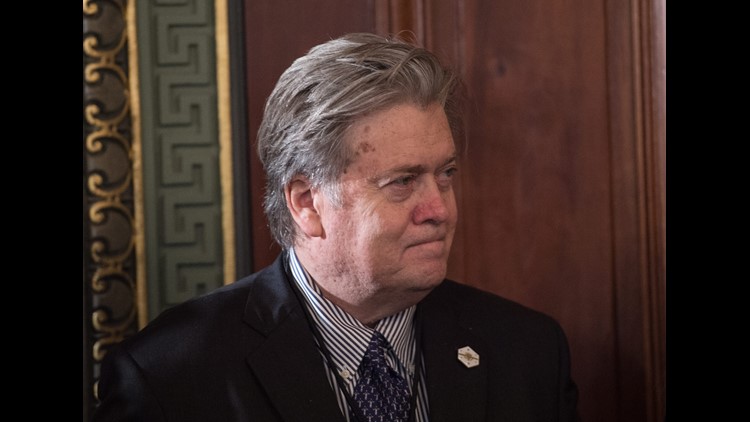WASHINGTON — The White House on Monday continued to defend President Trump’s decision to include his chief strategist, Stephen Bannon, as part of the National Security Council, while seeming to make attendance at council meetings optional for the director of national intelligence and chairman of the Joint Chiefs of Staff.
Press secretary Sean Spicer cast criticism of the move as “much ado about nothing” and said Obama political adviser David Axelrod and press secretary Robert Gibbs also attended NSC meetings.
“So all we did, frankly, was become transparent and actually put down on paper who’s going to attend, make sure that it’s out there for everyone to see who’s part of this committee,” he said on MSNBC. “This is an example of transparency and making sure we’re not trying to hide who’s going to be attending these meetings.”
The National Security Council was established in 1947 to advise the president and present viewpoints and policies from across the military and federal agencies and departments. Every administration typically issues a directive laying out the organization of the council.
But critics of Trump’s directive, issued in a memorandum Saturday, say they are worried about the inclusion of Bannon, a former Breitbart News editor. Sen. John McCain, R-Ariz., praised many of Trump’s national security picks, including Defense Secretary Jim Mattis, Homeland Security Secretary John Kelly and national security adviser Michael Flynn. But he said on Sunday that Trump’s reorganization of the council is “of concern.”
“I am worried about the National Security Council. Who are the members of it and who are the permanent members? The appointment of Mr. Bannon is something which is a radical departure from any National Security Council in history," McCain said on Face the Nation on CBS.
President George W. Bush specifically excluded his chief political adviser Karl Rove from council meetings, but Spicer said Bannon “isn’t playing Karl Rove’s part” in the Trump administration.
“Steve has an extensive military background, extensive background in geopolitical affairs, and the assumption that he's playing the same role as Karl Rove is just not accurate,” Spicer said on MSNBC. “And so, he brings to the table a much greater scope of the political landscape, vis-a-vis the world — the geopolitical landscape in national security affairs. And I think codifying it and putting it out there is something we're not trying to hide. In the Obama administration, they had people going in and out of NSC meetings without people knowing unless they got caught wind of.”
GOP Sen. John McCain comes out swinging against Trump administration
Trump adopts Nixon security model, except worse: Column
The first 100 days of the Trump presidency
Bannon served for seven years in the Navy, where he did stints as a surface warfare officer and as a special assistant to the Navy’s top admiral at the Pentagon, the Military Times reported. He earned a master’s degree in national security studies from Georgetown University and went on to attend Harvard Business School before taking a job at Goldman Sachs, a Wall Street investment bank.
He spent time as an investment banker, first with Goldman Sachs, then founded his own firm and eventually transitioned to media, Fortune reported.
He spent time in Hollywood, financing and producing films before taking over Breitbart News in 2012 after the death of its founder, Andrew Breitbart.
Trump tapped him in August last year to become chief strategist of his campaign and then appointed him chief strategist at the White House in November.
Some specialists say it’s too soon to judge what his inclusion on the National Security Council means.
“We should not read too much into this document in terms of projecting who will run the show, and based on what input,” said Matthew Dickinson, a political science professor at Middlebury College who has studied the presidency and presidential advisers. “Personalities matter a lot here, and you can’t get a feel for them based on a memorandum.”
Dickinson said that Bannon’s inclusion is “unusual” and noted that George W. Bush didn’t invite Rove because he “didn’t want to signal that politics was entering into national security decision-making."
“(But) one could argue that a pure separation of national security strategy and politics is not only unfeasible — it’s a bad idea,” Dickinson said. “Politics matters — if you don’t have political support for, say, intervening in Iraq, it is worth discussing that. Bottom line — I think the initial media reaction to the inclusion of Bannon is probably exaggerating its implications, but of course much depends on Bannon’s actual influence.”
Contributing: Gregory Korte and David Jackson.



